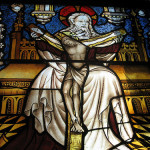We run our website the way we wished the whole internet worked: we provide high quality original content with no ads. We are funded solely by your direct support. Please consider supporting this project.

Is God All-Powerful?
I want to answer yes and no. God is all-powerful in the sense that God originally possessed all power. Before Creation, God was the only being who existed, and thus had all the power there was. He could do anything, and nothing opposed Him.
But with the creation of free creatures, I maintain, God necessarily surrendered a degree of His power. Or perhaps it is better to say God delegated some of His power. Our freedom is a little piece of “controlling power” lent us by God. In order to allow creatures to be free, then, God voluntarily gives us a portion of His power, and thereby surrenders His opportunity to “always get His way.” I don’t think it could be any other way, for freedom must entail that the free person can decide his own way—and it may not agree with God’s way. It is utterly impossible for God to be always in control and yet allow free beings to exercise some control. Thus, to the extent that God “lends” power away, He no longer utilizes it.”
However, what’s important to realize, is that this “surrender” of control is completely a voluntary act of God. If there is “limit” on God’s power, it is only there by His decision, not some power outside of Himself. If God at some point can’t do something (e.g., rid the world of a particular evil), it’s only because He decided to create a world in which there would be times when He could do nothing. Only if some power outside God limited God could He properly be said not to be omnipotent (all-powerful). Thus, in my view, God is in essence all-powerful, though He now chooses not to be. And the reason is because He desires a creation which is capable of love, and thus “must be free (have some “power” of its own).
A related question is: Is God in control? Again, yes and no. Since it is God Himself who delegates how much power each creature has, God is, in this sense, “in control.” He determines the parameters of our freedom within the flow of history which He directs, and in this sense God is always “in control.” For this reason there is absolutely no chance that God could ever lose this “cosmic battle.” As much power as Satan has, the ultimate purpose of God—to have a creation which shares love with Him—is never threatened.
However, God does not control each particular individual, for each person must be to some extent free. Hence, within the limits set by God, an individual may purpose to do things which are utterly at odds with God’s ultimate purpose. Thus, when an individual inflicts pain on another individual, I do not think we can go looking for “the purpose of God” in the event. Of course, God allowed the event to occur because His ultimate purpose includes having free agents, and this freedom must be irrevocable. But to “allow” something and to “purpose it” or “cause it” are two very different things.
While God has given humanity and other spiritual beings a great deal of freedom, He has not come close to surrendering all control to them. He is, even in this present still the most powerful being, even if He does not, by His own decision, exercise all power. God still exercises the dominating influence in the world, and He only knows what this world would be like without His constant, holy influence.
—adapted from Letters from a Skeptic, pages 57-60
Image by Josh Felise
Category: Q&A
Tags: Free Will, Letters from a Skeptic, Love, Omnipotence, Open Theism
Topics: Providence, Predestination and Free Will
Related Reading

Conservatives and Liberals in the Same Kingdom
Jesus did not allow the world to set the terms for what he did. For instance, he called Matthew, a tax collector, as well as Simon, a zealot, to be his disciples. Tax collectors were on the farthest right wing of Jewish politics, zealots on the farthest left. In fact, zealots despised tax collectors even…

Listen and Learn: A First Step Toward Reconciliation
Jesus Christ is not just the Lord, Savior and Messiah of the Jews: he is the Lord, Savior and Messiah of all people. Through Christ a kingdom is being established that tears down tribal walls between races and re-unites and reconciles people together in the love God. Paul makes the point most forcefully. In Ephesians…

God’s Dream for the World
The future doesn’t yet exist—which is why it’s future instead of the present or past—this doesn’t mean I’m claiming the future is wide open. To the contrary, it’s very clear from Scripture that God has a great plan for the future, and this plan steers the course of history by setting limits on what can…

When God’s “Plan A” Falls Through, What’s Next?
Image by Katie Tegtmeyer via Flickr Suzanne was angry, to say the least. Since her early teens, her only aspirations in life were to be a missionary to Taiwan and to marry a godly man with a similar vision, and she prayed daily about these. She went to a Christian college and, quite miraculously, quickly met…

Was Jesus Abandoned by the Father on the Cross?
As Jesus hung on the cross, he cried, “Eli, Eli, lema sabachthani?” (Mt 27:46). This is the cry of our God who stooped to the furthest possible depths to experience his own antithesis, as the all-holy God becomes the sin of the world (2 Cor 5:21) and the perfectly united God becomes the curse of…

What is the significance of Judges 10:13–16?
The Israelites cry out to God because of their oppression from foreign rulers. The Lord refuses to deliver them because they have abandoned him (vs. 13–14). The Israelites repented, put away their foreign gods and worshipped the Lord. The Lord “also could no longer bear to see Israel suffer” (vs. 16). Hence the Lord changed…
